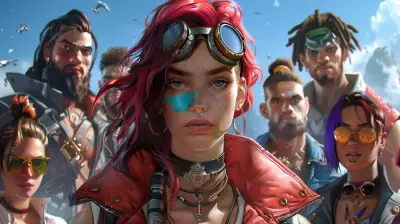2 December 2024
Gaming has come a long way, hasn’t it? From coin-operated arcade machines in the ‘80s to the sleek consoles and sprawling online worlds of today, the industry is constantly evolving. And now, there’s something new shaking up the gaming world—subscription models. If you’ve ever thought, “Wait, are gaming subscriptions really the future?” you’re not alone. It’s a fascinating topic, and today we’re diving headfirst into what’s happening, why it’s happening, and whether or not this trend is here to stick around.
So, grab your favorite snacks (or a cup of coffee), and let’s break it all down.
What Exactly Are Gaming Subscription Models?
Okay, let’s start with the basics. Subscription models in gaming are kind of like Netflix or Spotify but for video games. Instead of paying for individual games outright, you pay a monthly or yearly fee to access a library of games. Sounds simple, right? And not to mention, it’s kind of a dream for gamers who like to dabble in anything and everything.Gaming subscriptions come in all shapes and sizes these days:
- Xbox Game Pass: Microsoft’s Netflix-for-games subscription that offers hundreds of titles for Xbox and PC.
- PlayStation Plus Extra and Premium Tiers: Sony’s upgrade to its traditional PS Plus service that now includes a growing catalog of games.
- Nintendo Switch Online + Expansion Pack: Nintendo’s spin, complete with retro games and DLC.
- EA Play and Ubisoft+: Publishers getting in on the action with their own subscription services.
- Apple Arcade: Mobile gamers, Apple’s got your back too.
Each service has its own perks and quirks, but the idea is the same: a buffet-style gaming experience for a flat fee.
Why Are Gaming Companies Pushing Subscriptions?
So, why is everyone from Microsoft to the smaller studios jumping on the subscription bandwagon? It all boils down to one thing—money. Shocking, I know. But really, there’s a lot more to unpack.1. Steady Revenue Streams
Think about it. Selling games the old-fashioned way is hit or miss. A game might be a blockbuster one month and fizzle out the next. Subscriptions, though? They’re like the gift that keeps on giving—a consistent, predictable stream of income for publishers and platforms.2. Player Retention
Subscription services hook players for the long haul. If you’re paying for Game Pass or PlayStation Plus, you’re more likely to stick around and keep exploring the library instead of drifting off to other platforms. It’s like keeping you in an endless gaming mall where the doors never close.3. All-You-Can-Play Value
From a gamer’s perspective, subscriptions are insanely tempting. Why buy one $70 game when you can subscribe to a service and access hundreds? Especially in these times when everything seems to cost an arm and a leg, gaming subscriptions feel like a steal.4. A Playground for Indies
Indie developers also benefit here. Small studios get to showcase their games to a massive audience without worrying about high marketing budgets. And as subscribers, we get to discover hidden gems we might’ve ignored otherwise. It’s a win-win.
What Are the Benefits for Gamers?
Alright, so we’ve talked about why companies love subscriptions. But what about us, the gamers? Are we really benefiting, or is there a catch? Honestly, there’s a bit of both.Pros for Gamers
- Massive Game Libraries: Perfect for gamers who love variety or hate commitment. You can jump into different genres without hesitation—one week you’re battling dragons, the next you’re solving murder mysteries.- Affordability: Instead of dropping big bucks on every new release, a subscription can feel like an absolute bargain. It’s especially appealing for budget-conscious gamers.
- Day-One Launches: Some subscriptions, like Xbox Game Pass, give you access to AAA titles the day they’re released. That’s a huge deal.
- Flexibility: Not feeling a game? No worries. Just uninstall it and move on to the next one without feeling like you wasted your money.
The Trade-Offs
But, let’s be real—nothing is perfect. Here are some potential downsides of subscription models:- Game Removal: Subscriptions don’t let you "own" games. Titles can be removed from the platform without warning, which is a bummer if you’re halfway through a story.
- Subscription Overload: Between Netflix, Disney+, and now multiple gaming plans, things can quickly add up.
- Dependency on Internet Access: No internet? Say goodbye to downloading or streaming games from your subscription.

Are Subscriptions the Future of Gaming?
Here’s the million-dollar question: Are subscription models here to stay, or are they just the latest trend? The answer? Probably a bit of both.Why They Could Be the Future
Subscriptions fit perfectly into how we, as consumers, interact with entertainment nowadays. They offer convenience, flexibility, and crazy value—three things that modern-day gamers love. Plus, with technology like cloud gaming becoming more mainstream, subscriptions will likely evolve to offer even more perks.The Challenges Ahead
That being said, there are hurdles. Not everyone is a fan of the idea that you don’t truly "own" the games you play. What happens when a favorite title is taken off the library? Or when companies start increasing subscription fees, like we’ve seen with Netflix?Also, smaller studios might struggle in the long run. Yes, indie devs can reach larger audiences through subscriptions, but the revenue split with platforms like Game Pass might not be sustainable for everyone. It’s something to keep an eye on.
How Do Gamers Feel About All This?
Now, this part is interesting. Gamers are kind of split on the whole subscription thing. Some love it—it’s affordable, it’s accessible, and it keeps things fresh. Others? Not so much—they miss the sense of ownership that comes with buying physical or digital copies of games.There’s also a nostalgic factor at play. Remember the feeling of saving up for a specific title, buying it, and playing it to death? Subscriptions sort of erase that experience. It’s like comparing binge-watching a TV series on Netflix to watching it week-by-week as it airs.
What’s Next for Gaming Subscriptions?
If there’s one thing we know about gaming, it’s that nothing stays the same for long. Subscription models are still in their early days, and there’s plenty of room for innovation. Maybe we’ll see more hybrid models—a mix of outright game ownership and subscription-based access. Or perhaps platforms will compete by offering better perks, exclusives, or even merging services.One thing’s for sure: The gaming industry is paying attention to how we respond as consumers. So, in a way, we get to play a role in shaping the future of gaming. Pretty cool, right?
Final Thoughts
The rise of subscription models in gaming is impossible to ignore. Love them or hate them, they’re changing the way we play and pay for games. Whether you’re a casual gamer browsing through Apple Arcade on your commute or a hardcore fan exploring every nook and cranny of Xbox Game Pass, there’s no denying the impact these services are having.Will they become the new standard? Only time will tell. But for now, they’re here, they’re making waves, and they’re worth keeping an eye on. What do you think? Are gaming subscriptions your jam, or do you prefer to stick to the traditional way of owning games?










Kalani Vaughn
Oh, absolutely! Who doesn’t love paying monthly for the privilege of playing games we once bought outright? It’s like a gym membership for our thumbs—just what we needed, right? Can’t wait for the premium DLC for breathing!
February 1, 2025 at 3:30 PM